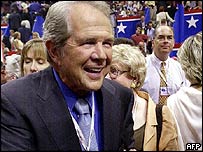US religious broadcaster Pat Robertson has called for the US to assassinate Venezuelan President Hugo Chavez.
Mr Robertson caused controversy with the comments on his TV show, describing Mr Chavez as "a terrific danger".
Venezuela's vice president accused Robertson of making "terrorist" remarks and said the US response would put its anti-terror policy to the test.
The US State Department said the comments were "inappropriate" and did not reflect the policy of the US.
'Cheaper than war'
Mr Robertson's remarks come amid tense diplomatic relations between Venezuela and Washington.
 |
 You know, I don't know about this doctrine of assassination, but if he thinks we're trying to assassinate him, I think that we really ought to go ahead and do it
You know, I don't know about this doctrine of assassination, but if he thinks we're trying to assassinate him, I think that we really ought to go ahead and do it

|
President Chavez is a regular critic of the US, which regards Venezuela as a possible source of instability in the region.
Mr Chavez has accused Washington of conspiring to topple his government and possibly backing plots to assassinate him. US officials have called the accusations ridiculous.
Mr Robertson, 75, said on Monday's edition of the 700 Club: "You know, I don't know about this doctrine of assassination, but if he thinks we're trying to assassinate him, I think that we really ought to go ahead and do it.
"It's a whole lot cheaper than starting a war ... and I don't think any oil shipments will stop."
Mr Robertson, founder of the Christian Coalition of America and a former presidential candidate, accused the United States of failing to act when Mr Chavez was briefly overthrown in 2002.
Venezuela is the fifth-largest oil exporter and a major supplier of oil to the United States.
Vice President Jose Vicente Rangel said Venezuela was studying its legal options.
"The ball is in the US court, after this criminal statement by a citizen of that country.
"It's huge hypocrisy to maintain this discourse against terrorism and at the same time, in the heart of that country there are entirely terrorist statements like those."
State Department spokesman San McCormack said Mr Robertson was speaking as a private citizen and that the US administration did not share his views.
A spokeswoman for the Christian Broadcasting Network told the BBC: "We are at a time of war and Pat had war on his mind when he made the comments."



~RS~q~RS~~RS~z~RS~31~RS~)


 Assassination call
Assassination call